HowlRound Essays End-of-Year Retrospective
January 2015 marks the four-year anniversary of the launch of the HowlRound Journal. Since our beginning, we have published nearly 900 authors who have contributed a journal article or blog post, which have been read by 585,045 unique visitors to the site—an average of more than 30,000 readers each month. Thank you to our contributors and readers; thank you for participating in the ongoing conversation about theatre.
For how similar our jobs are, theater artists and athletes don’t seem to talk much. We both train unwaveringly for performance day. We measure our successes by our own ability to push ourselves to new heights and depths, through new challenges. And, if we’re lucky enough to succeed, do we have a responsibility to use that platform to enable social justice and strengthen community? To use the amplification of our own voices to give voice to the silenced? To actively craft our own origin stories and narratives? This answer is different for each of us, but the question demands to be addressed continually over one’s career.
—Sport and Performance in Sochi by Lauren Keating
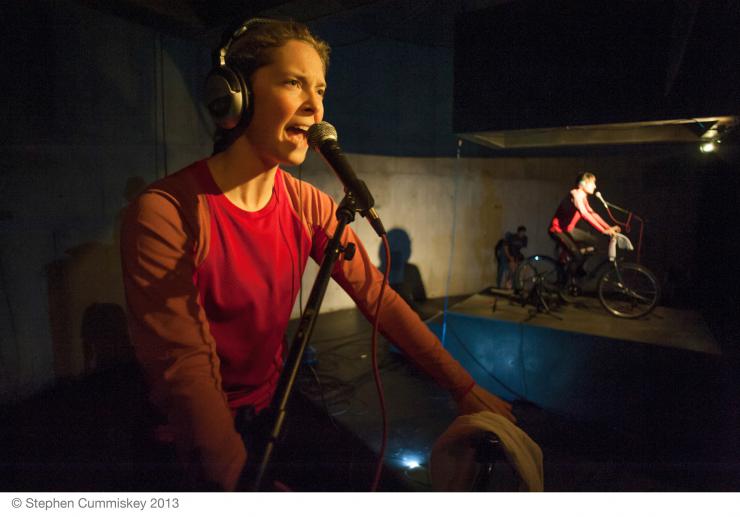
It’s clear that there is no single path to creating an environmentally-friendly theater culture. At the same time, ecological impact is an issue that the theater cannot afford to ignore. And, as a live art form, performance is uniquely suited to cut through the apathy caused by checklists, endless sensational television specials, or didactic speeches about the coming environmental apocalypse. And this message-in-the-moment isn’t just created by texts that address climate change, or by switching to solar-generated electricity and high-efficiency lights. It’s created by incorporating these techniques into the production’s aesthetics. … It’s long been said that some limitations promote creativity instead of stifling it. So why not approach the “restrictions” imposed by environmentally-friendly strategies as inspiration for innovation, as the very material for performance? The environmental movement is creating techniques and tools that are not only relevant for their green impact, but also for their theatrical potential. Riding a bike is just the beginning.
—Riding a Bike On Stage: Green Theater and Katie Mitchell’s Production of Lungs by Summer Banks
Climate art can show how characters come into a newly enlivened relationship with nature and how they help one another by inventing new strategies to sustain life. We’ve got to be as fearless in our climate art as the Greeks were in their tragedies, and dare to imagine the worst of all possible outcomes, but we need to discover ways to lift each other up and out before the final, fatal moment. We must create characters who recognize our common fate before it is too late and who act forcefully to turn grief to creative effort and to laughter. It might not happen this way; we might, in fact, be a species doomed by irrational hubris. But climate artists need to share the faith of climate scientists that once we comprehend the danger, we will be impelled to change. Climate art can give courage, as art does, to all who share concern for Earth by showing us fear, despair, insight and resolve. Climate artists must take up the knowledge of climate science and write its poetry in words that transmit Earth’s struggle and her glory and move audiences on an altogether new trajectory—the sheer joy of acting in concert across the globe to save that which is most precious in all the world—all the world.
—Climate Science’s Challenge to Artists by Karen Malpede
When we occupy positions of privilege, it’s important to recognize that the responsibility is on us to learn how our actions and words affect groups that are underrepresented in positions of power and influence in our society. It’s not someone’s job to teach us how to behave in the conversation—it’s our job to create the space for conversation where careful listening and thoughtful engagement helps us uncover how to interact with people with differing backgrounds who may be saying something that’s hard for us to hear.
—Stomping on Eggshells: An Honest Discussion of Race, Identity, and Intent in the American Theater by Rebecca Stevens
Theater is a place to be deeply together. The collaborative nature of theater and the fact that it is not for yourself, it is for others, and you are performing for an audience, you are giving a gift and every single person in the project is not exclusively for themselves. The whole team, the wardrobe people, the electricians, everyone is giving to something bigger than themselves. There is a holiness about that just inherent in the doing of it.
—Interview with Lear deBessonet by Polly Carl
Some folks say put the play in the center of the room. We say put the play in the center of yourself and respect that it lives in the center of each of your collaborators as well. Allow the possibility that your interpretation, your proposal for the performance text will yield if not an answer suitable for the final draft of the show, a totally valuable experiment in the search for that final draft, one that will inspire similar proposals from your collaborators. Instead of fearing that you’ll “get the play wrong,” start from a place of adventure, a place of possibility, let the work on the page inspire your creativity instead of minimizing it.
—How Do We Make It? Directors and the New Theater Landscape by Michael Rau and Will Davis
I was very surprised when after two months one of the actors said that he thought that the workshop was boring—I was even offended. I asked him why and he said, “All this pantomime,” and I said, “Yeah, but what would you like to do?” And he said to me “I would like to do Gorky.” I said, “How? You don’t speak, you don’t hear, you don’t see.” And he said “that is your problem! You are the director.” Once he said that to me, I realized he’s right, it is my problem. I am the director. But then I said “it’s your problem that you’re DeafBlind and you must find a way to act and to express yourself.” And this is actually the main part of our journey—to find a theatrical language between the actors and our audiences. There are so many actors that might be much better than they are, but there are no actors that are DeafBlind. The question is not what they cannot do, but what they can do much better than anyone else.
—Celebrating Our Imperfections: A Conversation with Adina Tal of Israel’s Nalaga’at Center by Kevin Becerra
Sports make us wonder—something theater can learn from. We wonder: what is going to happen next? Who is going to win? It could be the biggest game of the year, people could have spent fortunes on the tickets, but as soon as it’s clear which team will come out on top, the wonder is over and folks start heading for the exits. Try watching a recorded game when you already know who wins. It’s pointless. The magic of sports, for me, is that anything can happen: “It ain’t over ‘til it’s over.” But if it’s already over, anything can’t happen, it’s already happened even when I don’t know what happened.
—The Problem with Loving Sports and Theater by Mat Smart
We strive to carve out a space for a creative culture that is more than transactional, one that puts conversation and learning at the fore and puts the emphasis on the role of theater in civic life instead of on the way theater has been consumed and subsumed by the market economy. Some have found our frame of inquiry “Pollyanna like.”
—The Anxiety of Generosity and the Abundance of the Commons by Polly Carl
In the past thirteen years since 9/11 the world of Islam itself as well as the conflict between Western capitalist societies and Islam have spawned discourses and cataclysmic, traumatic events that seem to ask for a massive representational canvas. Fortunately for him, Akhtar has found a way to impose order on the seething chaos of Muslim and Western identities. “We still have that overarching desire to get a piece of that big pie. What I am trying to do is fracture that ambition into many different works because they are points of view, pictures of the importance of being Muslim today—over time perhaps what it might really be like to be Muslim today in the West can emerge from the plethora of representations.
—Pulitzer Playwright Ayad Akhtar on Aristotle and Islam by Srila Nayak
There are two myths about puppet theater that need to be exploded. The first of them is the more obvious. It is the myth that the puppeteer controls the puppet. As puppeteers, it is, surprisingly, not our job to impose our intent on the puppet. It is our job to discover what the puppet can do and what it seems to want to do. It has propensities. We want to find out what they are, and support them. We are, in this sense, less like tyrants, and more like nurses to these objects. How can we help them? They are built for a purpose. They seem to have destinies. We want to help them arrive at those destinies.
—The Myths of Puppet Theater by Eric Bass
My Tony Award has not granted me any special powers. It has had no effect on my fees (so that can’t be why producers would want to abolish it.) It came with no cash award, and, if I want to hock it, I must first offer it to the American Theater Wing for $25. It has, however, opened doors. But, more than that—it was an honor that resonated throughout my team, and reflected back on the entire company of Fela! This year, around twenty new sound designs will be heard on Broadway. I sure hope their creators get a chance to be acknowledged.
—Nine Thoughts On Theater Awards by Robert Kaplowitz
Having objectives doesn’t have to be detrimental to the creation and appreciation of art, but it does sometimes result in unexpected consequences. It’s a little like playing a game with a friend who has beaten it several times—the friend knows where to go and what to do to trigger events, and some of the mystery and discovery are lost on the newbie as a result. Are we creating gamified theater at the expense of the artistic experience at its core? If immersive theater is going to become a sustainable part of the theater ecosystem, we need to find ways to create an experience for the audience that allows everyone to enjoy the work as art.
—Learning from the Gamification of Theater by Megan Reilly
[H]ere in the States “auteurs” tend to gravitate to reimaginings of the classics and adaptations and devised work and work less on new plays. There’s a whole other kind of director here that we refer to as a “new play director.” The tendency for the latter—at least in theory—is to sublimate their vision to the playwright’s. They are expected to work “in the service” of the play and the playwright’s vision. (Of course it doesn’t always work this way...) Weirdly, I think this stems from a kind of unintended patronizing attitude on the part of theaters toward American playwrights. In my opinion, the idea of the director “serving” the playwright is nonsense and tends to produce bland work.
—Carlos Murillo and Henning Bochert: Playwright, Text, and Director in US Theater
I believe that theater at its heart is a peasant’s art form. It’s an art form of the dirt, the ocean, fire, air, and animals. It grows out of the elements and the very active nature of life, as well as the hearts, imaginations, and even magic of the group of folks who are coming together and making it. It’s universal. And when it’s at its best, theater is free in the most perfect and truest sense of the word, no matter how much or how little was spent on it.
—Cino Nights: Raw, Scrappy, and Full of Possibility by Daniel Talbott
The onus is on the artist to create an atmosphere and scenario for an audience to be open to an interactive experience, and to understand the techniques and considerations necessary to successfully engage with patrons. After all, the audience is placing their individual and collective trust in you, the artist(s), as soon as they enter the theater.
—Celebrating the Audience: Approaches to Participatory Performance by Josh Sobel
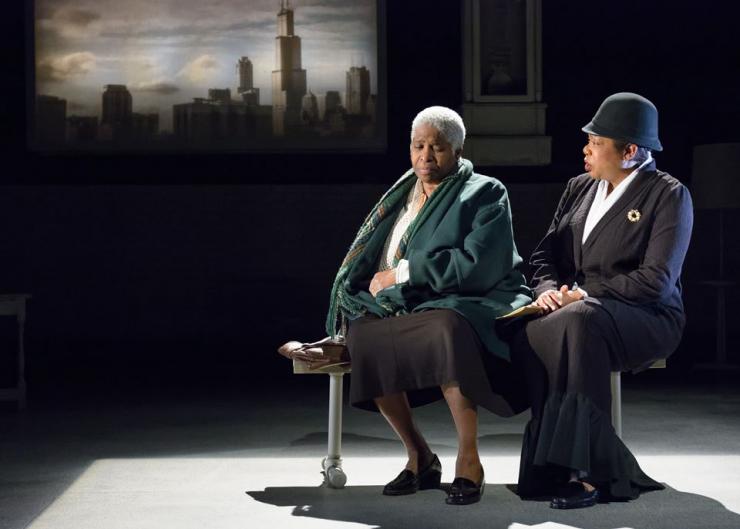
What shifted is that I can never be an authority on my subject matter. Most of the people I talked to, not only did they live in Chicago, they were born in Chicago. One of the actors described it by saying, to live in Chicago is to live with an open wound. Because there are so many deaths and people live with this as a daily occurrence. It’s different than any other place in the country. The complexity of what’s going on in Chicago means you can’t be an authority on that complexity in a year, in two years, in five years, because it has levels and layers. Some of the interviews were just spilling out of tears and release. No one ever asked them about how they dealt with their grief. I never was an authority, I was a listener. I’ve never had that experience before—I’m listening and trying to be open to the process.
—Interview with Marcus Gardley by Rebecca Stevens
In a way I’m feeling more incandescent androgyny in the room, with men writing amazing poetry and women writing muscular brutality. I don’t think there’s any essential gender really connected with voice. I have an essay in the book about the male orgasm and thought structure, which I just found so funny. One time a student was describing a structure like, “It’s like I’m going and I’m going and I’m going and then bam, it’s over,” and I was like, “Oh my gosh, you just described a seventeen-year-old male orgasm,” Then some women were describing their structures a little more diffusely—like “this happens, then this happens, then this happens,” and I was like, “Oh, that’s like several orgasms over the course of an evening, much more moment-to-moment.” I really hesitate at describing storytelling in such a way because it leads to these weird essentialist assumptions, like we’re doomed to write the way we orgasm, or we all orgasm the same according to our gender. I do think there’s something in the culture that has held up this arc as the only and the normal story structure, and this kind of moment-to-moment experience of unfolding is newer territory.
—Sarah Ruhl in Conversation with Polly Carl
There were two modes of preparation for a soiled soul: one was to go to a sporting event and, by rooting for an athlete, profound and cleansing emotions would be activated. The other option was to go to the theater, and, in passionate sympathetic contemplation, witness a story, a tragic turn of events, to identify, to empathize and to walk away purified. To create both holy terror and whole receptivity, then, was at the root of the [theatrical] experience.
—My Artistotle, My Las Vegas by Brighde Mullins
When I was eighteen and deciding to do circus, I was involved in a form where you take a risk on a daily basis. I became a trapeze artist. I think that when you take a risk in one corner of your life, it transfers over and makes you more courageous in the rest of your life. … I think that as a spectator to be able to watch something that is choreographic and beautiful and to be transported to a place where you see someone risking their lives in order to do it, and the stakes are that high, it produces an emotional response you can’t achieve in other forms.
—An Interview with 7 Fingers’ Gypsy Snider and Shana Carroll by Polly Carl
Tragedy arises not because of one character’s flaw, but because of the irresolvable clash of mutually exclusive value systems: family loyalty clashes with patriotism, sexual gratification clashes with social order, or friendship clashes with the realities of war.… The power of the great Greek tragedies, and the great tragedies of our age, is to be found in their unwillingness to dogmatically assert one value system over another. In a world of easy answers, tragedy dares to ask profound questions. That’s what they did in ancient Greece, and that’s what we need them to do today.
—Against the Dramaturgy of Punishment: From the Greeks to The Normal Heart by Andy Boyd
Writing transpeople well means being in relationship with transpeople. It means that when someone shows me a trans play they have written, we have enough trust and respect built between us that I can give them honest feedback and they can receive it. These kinds of relationships are necessary for representing any human experience that is not your own. I actually think this kind of research and education is necessary no matter what you’re writing. No choice we make is neutral and all stories we tell have implications. Even when writing our own stories we need to be accountable to community. How often have I noticed myself and other queer and trans artists simplifying our diverse realities for the sake of fitting them into acceptable narratives and gaining visibility?
—Beyond Cool: Moving Towards True Transgender Visibility by MJ Kaufman
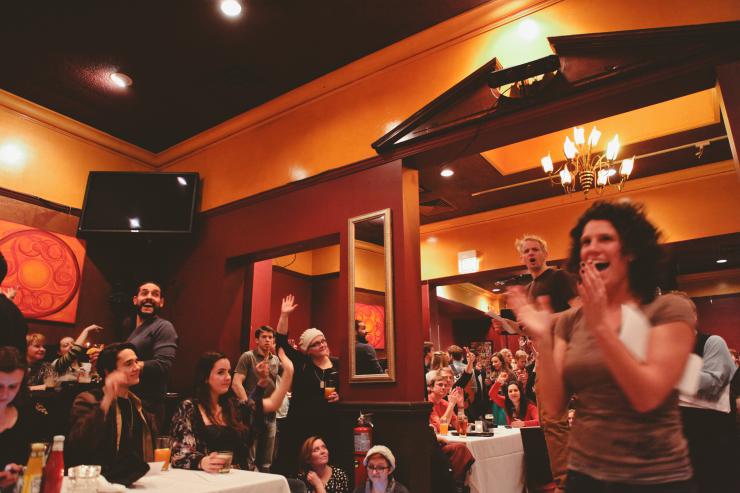
Ignoring the distance between Shakespeare’s theater and our own causes us to make his plays sanctimonious, formal, and yes: unrelatable…We can bridge that distance by closing the social loop between crowd and stage that Shakespeare never intended to break, and by taking advantage of a very contemporary, even Millennial, desire to relate to what we watch.
—Let Us Not Thumb Our Noses by Samuel Taylor
I'm an ensemble theater artist. I like messy collaborations. I thrive in rooms where ideas are flying from everyone, and our role is to capture them, to explore them—maybe to explode them—and to hone them into a performance that can illuminate something new, or needing-to-be-known about life. I am at my best when my ideas are never treated as the best ideas in the room, but when the ensemble creating the piece feels free and safe enough to bring in anything and together we can shape it. My job, as I've always expressed it, is to, with the designers, make sure the world is as clear and understood as possible, and then to get out of the way for a little while.
—Attending My Own Wake: The End of an Ensemble by Meg Taintor


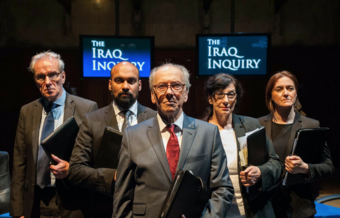



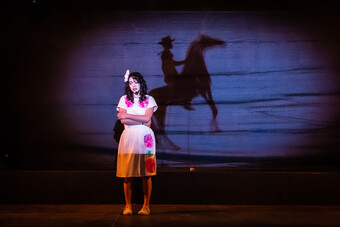









Comments
The article is just the start of the conversation—we want to know what you think about this subject, too! HowlRound is a space for knowledge-sharing, and we welcome spirited, thoughtful, and on-topic dialogue. Find our full comments policy here